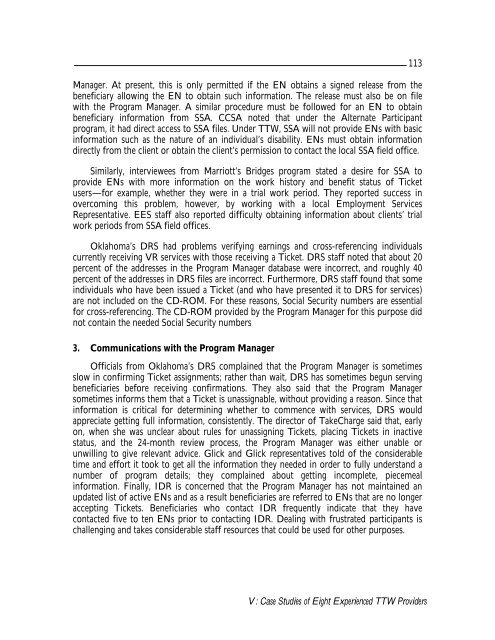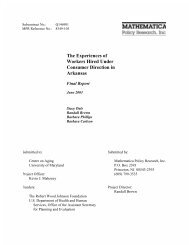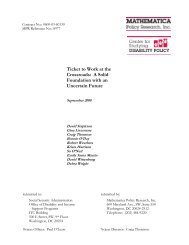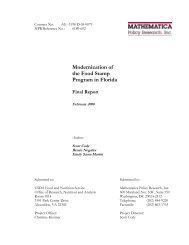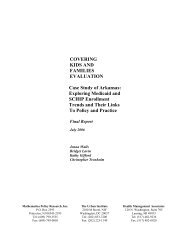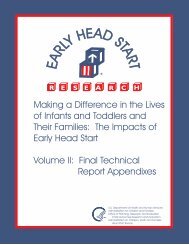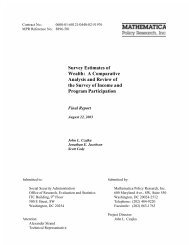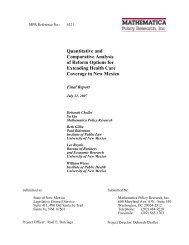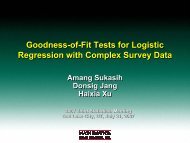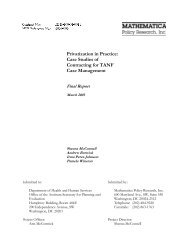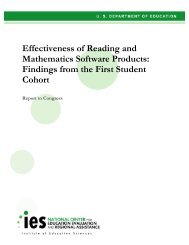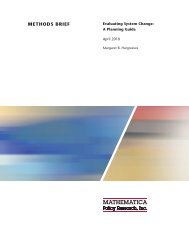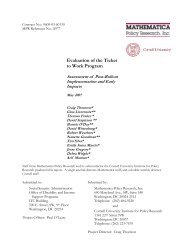Evaluation of the Ticket to Work Program Initial Evaluation Report
Evaluation of the Ticket to Work Program Initial Evaluation Report
Evaluation of the Ticket to Work Program Initial Evaluation Report
You also want an ePaper? Increase the reach of your titles
YUMPU automatically turns print PDFs into web optimized ePapers that Google loves.
Manager. At present, this is only permitted if <strong>the</strong> EN obtains a signed release from <strong>the</strong><br />
beneficiary allowing <strong>the</strong> EN <strong>to</strong> obtain such information. The release must also be on file<br />
with <strong>the</strong> <strong>Program</strong> Manager. A similar procedure must be followed for an EN <strong>to</strong> obtain<br />
beneficiary information from SSA. CCSA noted that under <strong>the</strong> Alternate Participant<br />
program, it had direct access <strong>to</strong> SSA files. Under TTW, SSA will not provide ENs with basic<br />
information such as <strong>the</strong> nature <strong>of</strong> an individual’s disability. ENs must obtain information<br />
directly from <strong>the</strong> client or obtain <strong>the</strong> client’s permission <strong>to</strong> contact <strong>the</strong> local SSA field <strong>of</strong>fice.<br />
Similarly, interviewees from Marriott’s Bridges program stated a desire for SSA <strong>to</strong><br />
provide ENs with more information on <strong>the</strong> work his<strong>to</strong>ry and benefit status <strong>of</strong> <strong>Ticket</strong><br />
users—for example, whe<strong>the</strong>r <strong>the</strong>y were in a trial work period. They reported success in<br />
overcoming this problem, however, by working with a local Employment Services<br />
Representative. EES staff also reported difficulty obtaining information about clients’ trial<br />
work periods from SSA field <strong>of</strong>fices.<br />
Oklahoma’s DRS had problems verifying earnings and cross-referencing individuals<br />
currently receiving VR services with those receiving a <strong>Ticket</strong>. DRS staff noted that about 20<br />
percent <strong>of</strong> <strong>the</strong> addresses in <strong>the</strong> <strong>Program</strong> Manager database were incorrect, and roughly 40<br />
percent <strong>of</strong> <strong>the</strong> addresses in DRS files are incorrect. Fur<strong>the</strong>rmore, DRS staff found that some<br />
individuals who have been issued a <strong>Ticket</strong> (and who have presented it <strong>to</strong> DRS for services)<br />
are not included on <strong>the</strong> CD-ROM. For <strong>the</strong>se reasons, Social Security numbers are essential<br />
for cross-referencing. The CD-ROM provided by <strong>the</strong> <strong>Program</strong> Manager for this purpose did<br />
not contain <strong>the</strong> needed Social Security numbers<br />
3. Communications with <strong>the</strong> <strong>Program</strong> Manager<br />
Officials from Oklahoma’s DRS complained that <strong>the</strong> <strong>Program</strong> Manager is sometimes<br />
slow in confirming <strong>Ticket</strong> assignments; ra<strong>the</strong>r than wait, DRS has sometimes begun serving<br />
beneficiaries before receiving confirmations. They also said that <strong>the</strong> <strong>Program</strong> Manager<br />
sometimes informs <strong>the</strong>m that a <strong>Ticket</strong> is unassignable, without providing a reason. Since that<br />
information is critical for determining whe<strong>the</strong>r <strong>to</strong> commence with services, DRS would<br />
appreciate getting full information, consistently. The direc<strong>to</strong>r <strong>of</strong> TakeCharge said that, early<br />
on, when she was unclear about rules for unassigning <strong>Ticket</strong>s, placing <strong>Ticket</strong>s in inactive<br />
status, and <strong>the</strong> 24-month review process, <strong>the</strong> <strong>Program</strong> Manager was ei<strong>the</strong>r unable or<br />
unwilling <strong>to</strong> give relevant advice. Glick and Glick representatives <strong>to</strong>ld <strong>of</strong> <strong>the</strong> considerable<br />
time and effort it <strong>to</strong>ok <strong>to</strong> get all <strong>the</strong> information <strong>the</strong>y needed in order <strong>to</strong> fully understand a<br />
number <strong>of</strong> program details; <strong>the</strong>y complained about getting incomplete, piecemeal<br />
information. Finally, IDR is concerned that <strong>the</strong> <strong>Program</strong> Manager has not maintained an<br />
updated list <strong>of</strong> active ENs and as a result beneficiaries are referred <strong>to</strong> ENs that are no longer<br />
accepting <strong>Ticket</strong>s. Beneficiaries who contact IDR frequently indicate that <strong>the</strong>y have<br />
contacted five <strong>to</strong> ten ENs prior <strong>to</strong> contacting IDR. Dealing with frustrated participants is<br />
challenging and takes considerable staff resources that could be used for o<strong>the</strong>r purposes.<br />
113<br />
V: Case Studies <strong>of</strong> Eight Experienced TTW Providers


